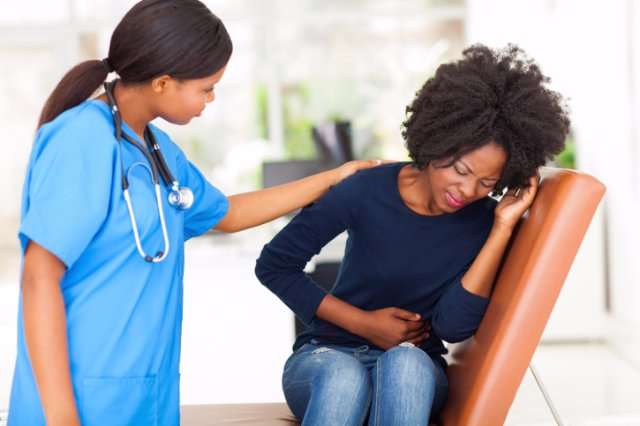The answer is prostaglandins. According to society for endocrinology, prostaglandins are created at sites of damaged or infected tissue to enhance formation of blood-clot to help in the healing process.

By causing the contraction of the blood vessel wall, blood loss is prevented.
These are the chemical signals girl’s and women’s bodies make and send to the uterus to tell it to contract, thus expelling the uterine lining at the end of the menstrual cycle.
Prostaglandins aren’t super picky about whom they talk to. However, if the body sends enough of them to the uterus, some prostaglandins will make it to the bowel; located nearby.
There, they also notify the bowel to contract, thus expelling… you know.
Not all women experience more frequent bowel movement when they have their monthly period. Some girls feel the effect of prostaglandin on their bowels as nauseous. Others actually get diarrhea while others are not so bothered about it at all.
Incidentally, those who get painful cramps can blame high levels of prostaglandins. Some women’s bodies are just overzealous in the prostaglandin production. This makes the uterus contract more strongly. Especially contractions, the blood supply to the uterus gets cut off, causing pain.
Another reason some women poop more during their periods is because their progesterone level falls. Progesterone is a hormone that levels cycle with the menstrual cycle. Normally, at the middle of her cycle, a woman’s progesterone levels are high. Just before her period, however, the level drops suddenly, helping kick of the period.
Progesterone is naturally a bit constipating, too, so its sudden decline can make them feel like really going to go frequently.
If a woman uses birth control -one in five women of childbearing age in the US does. The hormone and chemical levels differ. Hormonal birth control often reduces how much prostaglandin the body makes, which is why it reduces painful endless cramps.
That also means the prostaglandins aren’t at work making women poop. Nevertheless, a woman taking birth control may still feel some gastrointestinal effects just before her “period”.
Many birth control pills have a series of placebo pills that don’t have any hormones in them, which patients are supposed to take once a cycle. Most modern birth controls have some kind of synthetic progesterone in them. So when patients take their placebo pills, their progesterone levels fall suddenly.













